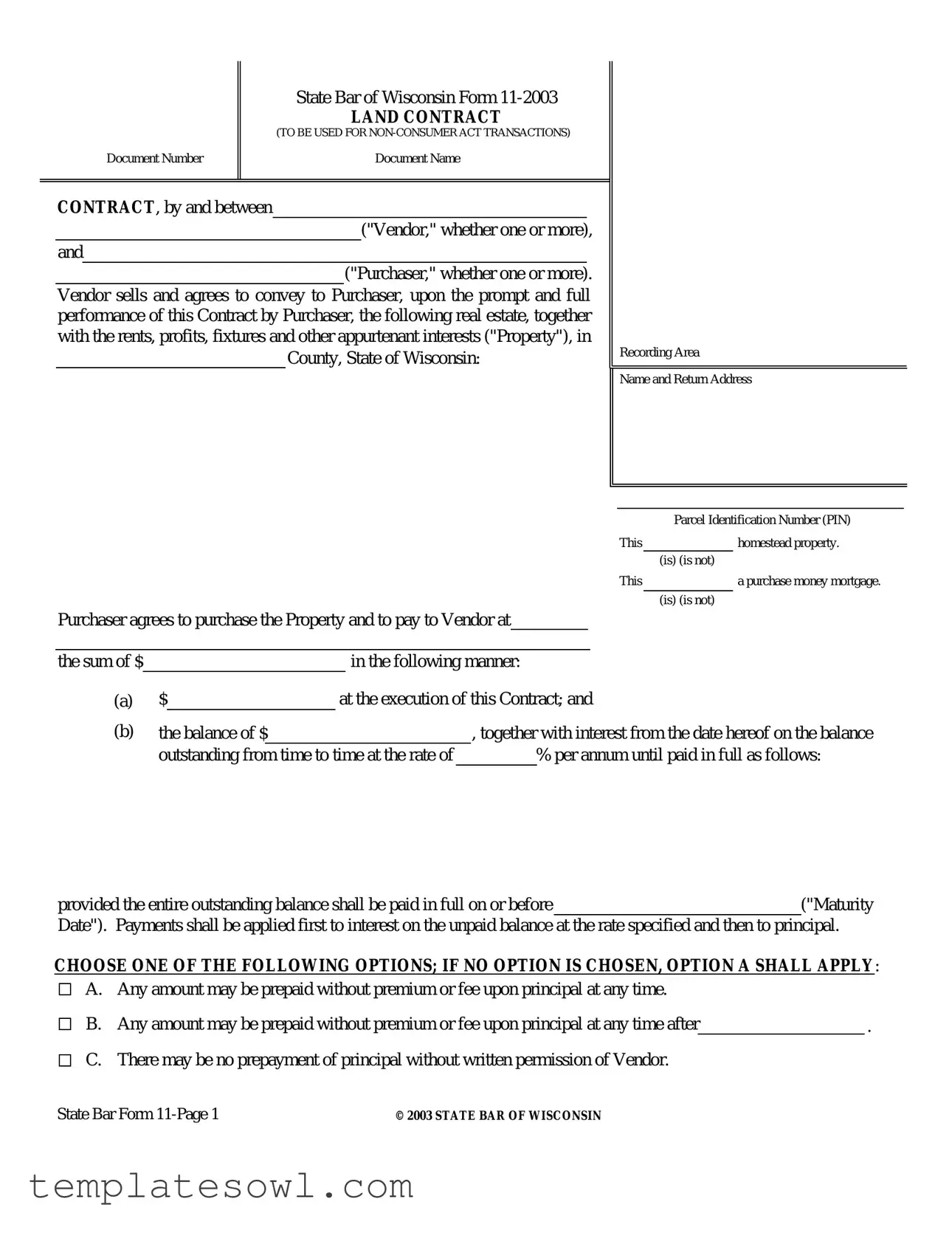Fill Out Your Wisconsin Land Contract Form
The Wisconsin Land Contract form serves as a critical document in real estate transactions within the state, particularly for non-consumer act transactions. It outlines the essential agreement between the Vendor, who sells the property, and the Purchaser, who agrees to buy it. Central to this contract is the agreement to convey specific real estate upon the full performance of the contract terms. Key elements include the description of the property, its identification by parcel number, and the conditions surrounding the payment structure. The payment terms detail the total price, the initial payment upon execution, subsequent payments, and the interest rate applicable until the full amount is paid. Importantly, the contract stipulates conditions for property maintenance, the obligation for insurance, and tax payments, outlining the responsibilities of both parties. Provisions for prepayment, potential default scenarios, and the consequences thereof are also clearly stated. Notably, the contract culminates in a Warranty Deed from the Vendor to the Purchaser, contingent upon the successful fulfillment of all conditions. This form represents a comprehensive legal instrument designed to protect the interests of both parties involved in Wisconsin's real estate market.
Wisconsin Land Contract Example

State Bar of Wisconsin Form
LAND CONTRACT
(TO BE USED FOR
Document Number |
Document Name |
CONTRACT, by and between
("Vendor," whether one or more),
and
("Purchaser," whether one or more). Vendor sells and agrees to convey to Purchaser, upon the prompt and full performance of this Contract by Purchaser, the following real estate, together with the rents, profits, fixtures and other appurtenant interests ("Property"), in
County, State of Wisconsin:
Recording Area
Name and Return Address
|
|
|
|
|
|
|
|
|
|
|
|
Parcel Identification Number (PIN) |
|
|
|
|
|
|
|
|
|
|
|
|
This |
|
homestead property. |
|
|
|
|
|
|
|
|
|
|
|
|
(is) (is not) |
|
|
|
|
|
|
|
|
|
|
|
|
This |
|
a purchase money mortgage. |
|
|
|
|
|
|
|
|
|
|
|
|
(is) (is not) |
|
Purchaser agrees to purchase the Property and to pay to Vendor at |
|
|
|
|
|
|
|||||||
|
|
|
|
|
|
|
|
|
|
|
|||
the sum of $ |
|
|
|
|
in the following manner: |
|
|
|
|
|
|||
(a) |
$ |
|
|
at the execution of this Contract; and |
|
|
|||||||
(b) |
the balance of $ |
|
|
|
|
, together with interest from the date hereof on the balance |
|||||||
|
outstanding from time to time at the rate of |
|
% per annum until paid in full as follows: |
||||||||||
provided the entire outstanding balance shall be paid in full on or before("Maturity
Date"). Payments shall be applied first to interest on the unpaid balance at the rate specified and then to principal.
CHOOSE ONE OF THE FOLLOWING OPTIONS; IF NO OPTION IS CHOSEN, OPTION A SHALL APPLY:
A. |
Any amount may be prepaid without premium or fee upon principal at any time. |
|
|
B. |
Any amount may be prepaid without premium or fee upon principal at any time after |
. |
|
C. |
There may be no prepayment of principal without written permission of Vendor. |
|
|
State Bar Form |
© 2003 STATE BAR OF WISCONSIN |

CHOOSE ONE OF THE FOLLOWING OPTIONS; IF NEITHER IS CHOSEN, OPTION A SHALL APPLY:
A. Any prepayment shall be applied to principal in the inverse order of maturity and shall not delay the due dates or change the amount of the remaining payments until the unpaid balance of principal and interest is paid in full.
B. In the event of any prepayment, this Contract shall not be treated as in default with respect to payment so long as the unpaid balance of principal and interest (and in such case accruing interest from month to month shall be treated as unpaid principal) is less than the amount that said indebtedness would have been had the monthly payments been made as specified above; provided that monthly payments shall continue in the event of credit of any proceeds of insurance or condemnation, the condemned premises being thereafter excluded from this Contract.
Purchaser shall pay prior to delinquency all taxes and assessments levied on the Property at the time of the execution of this Contract and thereafter, and deliver to Vendor on demand receipts showing such payment.
Purchaser shall keep the improvements on the Property insured against loss or damage occasioned by fire, extended coverage perils and such other hazards as Vendor may require, without
Purchaser is required to pay Vendor amounts sufficient to pay reasonably anticipated taxes, assessments, and insurance premiums as part of Purchaser's regular payments [CHECK BOX AT LEFT IF APPLICABLE].
Purchaser shall not commit waste nor allow waste to be committed on the Property, keep the Property in good tenantable condition and repair, and free from liens superior to the lien of this Contract, and comply with all laws, ordinances and regulations affecting the Property. If a repair required of Purchaser relates to an insured casualty, Purchaser shall not be responsible for performing such repair if Vendor does not make available to Purchaser the insurance proceeds therefor.
Vendor agrees that if the purchase price with interest is fully paid and all conditions fully performed as specified herein, Vendor will execute and deliver to Purchaser a Warranty Deed in fee simple of the Property, free and clear of all liens and encumbrances, except those created by the act or default of Purchaser, and:
CHOOSE ONE OF THE FOLLOWING OPTIONS; IF NO OPTION IS CHOSEN, OPTION A SHALL APPLY:
A. Purchaser states that Purchaser is satisfied with the title as shown by the title evidence submitted to Purchaser for examination, at the time of execution of this Contract.
B. Purchaser states that the following exceptions set forth in the title evidence submitted to Purchaser for examination, at the time of execution of this Contract, are unsatisfactory to Purchaser:
C. No title evidence was provided prior to execution of this Contract.
State Bar Form |
© 2003 STATE BAR OF WISCONSIN |

CHOOSE ONE OF THE FOLLOWING OPTIONS; IF NEITHER IS CHOSEN, OPTION A SHALL APPLY:
A. Purchaser agrees to pay the cost of future title evidence.
B. Vendor agrees to pay the cost of future title evidence.
Purchaser shall be entitled to take possession of the Property on |
|
. |
Time is of the essence as to all provisions hereunder.
Purchaser agrees that in the event of a default in the payment of principal or interest which continues for a period of days following the due date or a default in performance of any other obligation of Purchaser which continues
for a period ofdays following written notice thereof by Vendor (delivered personally or mailed by certified mail), the entire outstanding balance under this contract shall become immediately due and payable at Vendor's option and without notice (which Purchaser hereby waives), and Vendor may singly, alternatively or in combination: (i) terminate this Contract and either recover the Property through strict foreclosure or have the Property sold by foreclosure sale; in either event, with a period of redemption, in the court's discretion, to be conditioned on full payment of the entire outstanding balance, with interest thereon from the date of default and other amounts due hereunder (failing which all amounts previously paid by Purchaser shall be forfeited as liquidated damages for failure to fulfill this Contract and as rental for the Property); (ii) sue for specific performance of this Contract; (iii) sue for the unpaid purchase price or any portion thereof; (iv) declare this Contract at an end and remove this Contract as a cloud on title in a
Following any default in payment, interest shall accrue at the rate of% per annum on the entire amount in
default (which shall include, without limitation, delinquent interest and, upon acceleration or maturity, the entire principal balance).
Vendor may waive any default without waiving any other subsequent or prior default of Purchaser.
Purchaser may not transfer, sell or convey any legal or equitable interest in the Property, including but not limited to a lease for a term greater than one year, without the prior written consent of Vendor unless the outstanding balance payable under this Contract is paid in full. In the event of any such transfer, sale or conveyance without Vendor's written consent, the entire outstanding balance payable under this Contract shall become immediately due and payable in full at Vendor's option without notice.
Vendor may mortgage the Property, including the continuation of any mortgage in force on the date of this Contract, provided Vendor shall make timely payment of all amounts due under any mortgage, and the total due under such mortgages shall not at any time exceed the then remaining principal balance under this Contract. If Vendor defaults under such mortgages and Purchaser is not in default hereunder, Purchaser may make payments directly to Vendor's mortgagee and such payments will be credited as payments hereunder.
All terms of this Contract shall be binding upon and inure to the benefit of the heirs, legal representatives, successors and assigns of Vendor and Purchaser.
State Bar Form |
© 2003 STATE BAR OF WISCONSIN |

Dated |
|
. |
VENDOR:PURCHASER:
|
|
(SEAL) |
|
|
(SEAL) |
* |
|
(SEAL) |
* |
|
(SEAL) |
|
|
|
|
||
* |
|
|
* |
|
|
AUTHENTICATION
Signature(s)
authenticated on |
|
. |
*
TITLE: MEMBER STATE BAR OF WISCONSIN (If not,
authorized by Wis. Stat. § 706.06)
ACKNOWLEDGMENT |
|
|
|
|||
STATE OF WISCONSIN |
) |
|
|
|||
|
|
|
|
) ss. |
||
|
|
|
COUNTY |
) |
|
|
Personally came before me on |
, |
|||||
the |
|
|
|
|
|
|
to me known to be the person(s) who executed the foregoing instrument and acknowledged the same.
THIS INSTRUMENT DRAFTED BY: |
|
|
|
|
|
|
|
|
|
||
* |
|
|
|
||
|
|
Notary Public, State of Wisconsin |
|
||
|
|
|
|
||
|
My Commission (is permanent) (expires: |
|
) |
||
|
|||||
(Signatures may be authenticated or acknowledged. Both are not necessary.)
NOTE: THIS IS A STANDARD FORM. ANY MODIFICATIONS TO THIS FORM SHOULD BE CLEARLY IDENTIFIED.
LAND CONTRACT |
STATE BAR OF WISCONSIN |
FORM NO. |
* Type name below signatures.
State Bar Form |
© 2003 STATE BAR OF WISCONSIN |
Reset
Form Characteristics
| Fact Name | Description |
|---|---|
| Form Purpose | This Land Contract form is specifically designed for transactions that do not fall under the Consumer Act provisions in Wisconsin. |
| Governing Laws | The contract is governed by Wisconsin Statutes, particularly Wis. Stat. § 706.06, which pertains to land contracts and their enforcement. |
| Prepayment Options | The contract includes several options regarding prepayment of principal, allowing flexibility based on the vendor's choice. |
| Insurance Responsibilities | Purchasers are required to maintain insurance on the property, ensuring that the Vendor's interest is protected against potential losses. |
| Default Consequences | In the event of a default, the Vendor has multiple remedies available, including foreclosure and recovery of the property. |
Guidelines on Utilizing Wisconsin Land Contract
Filling out a Wisconsin Land Contract form is an essential step when buying or selling real estate. It outlines the agreement between the Vendor (seller) and Purchaser (buyer). Once completed, the form serves as a legally binding document that protects both parties. Follow these steps to ensure the form is filled out correctly.
- Title the Document: At the top of the form, label it as a “Land Contract.”
- Identify the Vendor and Purchaser: Fill in the full names of the Vendor(s) and Purchaser(s) in the designated spaces.
- Describe the Property: Provide a detailed description of the property being sold, including the County and State of Wisconsin.
- Parcel Identification Number: Enter the Parcel Identification Number (PIN) associated with the property.
- Homestead Property: Indicate whether the property is a homestead by checking the appropriate box.
- Purchase Money Mortgage: State if the property involves a purchase money mortgage.
- Payment Details: Fill in the total purchase amount and details of the payment plan, including down payment and balance with interest rate.
- Maturity Date: Specify the date by which the entire balance must be paid.
- Prepayment Options: Choose one of the options regarding prepayment of the principal amount.
- Tax and Insurance Obligations: Confirm Purchaser's obligations to pay taxes and maintain insurance on the property.
- Repairs and Maintenance: Outline the responsibilities for property upkeep and conditions regarding restoration after an insured event.
- Title Condition: Indicate Purchaser’s satisfaction regarding title evidence or any exceptions noted.
- Possession of Property: State the date when the Purchaser will take possession of the property.
- Default Provisions: Note conditions that would amount to default and possible remedies available to the Vendor.
- Signatures: Ensure all parties sign and date the contract at the end. If necessary, have the notary public authenticate the signatures.
What You Should Know About This Form
What is a Wisconsin Land Contract?
A Wisconsin Land Contract is a legal document used for real estate transactions, primarily involving the sale of property. In this agreement, the seller, referred to as the Vendor, agrees to sell a property to the buyer, known as the Purchaser. The Purchaser makes payments over time until the purchase price is fully paid, at which point the Vendor will transfer the ownership of the property to the Purchaser. It is particularly useful for parties arranging financing outside traditional mortgage mechanisms.
What are the benefits of using a Land Contract in Wisconsin?
Using a Land Contract can provide several advantages. For buyers, it may be easier to qualify for this type of financing since it often involves more flexible terms compared to conventional banks. It allows them to purchase property without needing a large down payment or perfect credit. For sellers, it can result in a steady stream of income from interest on the payments. Additionally, Land Contracts can facilitate quicker transactions with less red tape, making it attractive for both parties.
What should I consider before entering into a Land Contract?
Before entering into a Land Contract, both parties should carefully review the terms and conditions outlined in the agreement. It is essential to clarify payment schedules, interest rates, and responsibilities regarding property taxes and insurance. Both the Vendor and Purchaser should assess their financial situations and consider the long-term obligations involved. Consulting a legal professional may also be wise, ensuring that all potential risks are understood and that the Contract meets legal requirements.
What happens if a Purchaser defaults on a Land Contract?
If a Purchaser defaults on a Land Contract, meaning they fail to make timely payments or uphold other obligations outlined in the agreement, the Vendor has several options. The Vendor may declare the entire balance due and payable immediately. They can also initiate foreclosure proceedings to recover the property. However, before taking any action, the Vendor is required to notify the Purchaser of the default and give them a specified period to remedy the situation. It's important for both parties to understand their rights and responsibilities regarding defaults, as outlined in the Contract.
Common mistakes
Filling out a Wisconsin Land Contract can be a daunting task, and many people make mistakes that can lead to misunderstandings or legal issues. One common error is failing to clearly identify the parties involved. It’s essential to list both the Vendor and the Purchaser correctly, as any confusion in names can complicate the enforcement of the contract.
Another frequent mistake is neglecting to specify the property details. The form requires precise information about the real estate being sold, such as its location and Parcel Identification Number (PIN). Omitting this information risks disputes over what property is actually being transferred.
When it comes to financial terms, many individuals forget to indicate the specific payment terms. Leaving blanks in the contract regarding the purchase price or payment schedule can lead to ambiguity. It is very important for both parties to agree on and clearly state how much is due at the outset and how the remaining balance will be structured.
People often overlook the importance of selecting prepayment options. The contract allows choices regarding prepayment of principal, yet if no option is selected, Option A applies by default, which might not suit the needs of the parties involved. This can lead to unexpected financial penalties or limitations later on.
Another critical point is the failure to confirm who will pay for future title evidence. This detail can have substantial financial implications. Misunderstandings regarding this cost can create friction between the Vendor and Purchaser long after the contract has been signed.
Insurance obligations are also frequently mishandled. The Purchaser is typically required to insure the property, but some individuals neglect to ensure that the insurance policies named in the contract adequately cover the interests of the Vendor. This oversight can jeopardize the Vendor's investment in case of property damage.
Additionally, many overlook the need to maintain clear communication regarding taxes and assessments on the property. Failing to clarify who is responsible for these costs during the effective period of the contract can lead to disputes over unpaid obligations.
A prevalent error is not paying attention to the default clauses. Understanding the consequences of defaulting—especially regarding payment or performance—is crucial. If these provisions are not fully understood or adhered to, it can result in severe penalties, including the loss of the property.
Lastly, people sometimes forget to ensure that all signatures are properly authenticated. The absence of a notary may invalidate the agreement, leaving both parties vulnerable to legal challenges. Properly executing the form with the necessary acknowledgments is vital to protect the rights of both Vendor and Purchaser.
Documents used along the form
The Wisconsin Land Contract form is often accompanied by several other documents that facilitate the transaction and ensure compliance with relevant standards and regulations. These associated documents provide clarity, establish rights and responsibilities, and may protect interests of all parties involved in the real estate transaction.
- Warranty Deed: This document is executed by the vendor upon full payment of the agreed purchase price. It transfers ownership of the property to the purchaser, guaranteeing that the vendor has the right to sell and that the property is free of undisclosed liens and encumbrances.
- Title Insurance Policy: A title insurance policy protects the purchaser from potential claims against the title of the property. This document ensures that the purchaser's ownership is secure and that any issues arising from prior ownership will be addressed.
- Real Estate Purchase Agreement: This agreement outlines the terms of the sale, including the price, any contingencies, and the timeline for the transaction. It serves as a contract between the vendor and purchaser prior to finalizing the land contract.
- Amortization Schedule: An amortization schedule details the repayment plan for the purchase price of the property, breaking down each payment into principal and interest components over time. This document provides transparency regarding payment expectations.
- Disclosure Statements: These are required by law and include information about the property’s condition, including any known defects or issues. The vendor must disclose any significant facts that may affect the value or desirability of the property.
- Escrow Agreement: This agreement outlines the terms under which a neutral third party holds funds or documents until all conditions of the land contract are met. It helps ensure that both parties fulfill their obligations before finalizing the transaction.
- Property Inspection Report: Often completed before the sale, this report evaluates the property’s condition. It can identify existing issues that may affect the property’s value and informs the purchaser about necessary repairs or maintenance.
These documents work in conjunction with the Wisconsin Land Contract to establish a clear framework for the transaction and protect the interests of both parties. Proper understanding and utilization of these forms can lead to a smoother real estate process.
Similar forms
- Purchase Agreement: This document outlines the terms of a sale between a buyer and seller. Similar to a Land Contract, it specifies price, payment terms, and property details. However, a Purchase Agreement typically transfers ownership immediately upon closing, while a Land Contract allows the seller to retain title until paid in full.
- Lease Purchase Agreement: This combines a lease with an option to purchase the property. Like a Land Contract, it provides a pathway for the tenant to buy the property, but involves renting with rent payments potentially contributing to the purchase price.
- Real Estate Mortgage: A mortgage secures a loan with the property. While a Land Contract stipulates payments over time with the seller retaining title, a mortgage transfers title to the buyer while the lender holds a lien until the debt is paid off.
- Quit Claim Deed: This type of deed transfers whatever interest the grantor has in the property without guaranteeing the quality of that interest. It contrasts with the structured repayment in a Land Contract and does not often involve payment terms.
- Promissory Note: A note evidences a borrower's promise to pay back a loan. Similar to the payment obligations in a Land Contract, it focuses on repayment but lacks the property transfer considerations until fully paid.
- Option to Purchase Agreement: This grants the buyer the right to buy property within a specified timeframe. Like a Land Contract, it outlines terms, but differs in that it does not require the buyer to complete the purchase.
- Installment Sale Agreement: This outlines terms for buyers who make payments over time. Like a Land Contract, ownership is transferred upon full payment, securing buyer rights, but with more formalized terms regarding payment installments.
- Deed of Trust: In this arrangement, a neutral third party holds the title until the borrower repays the loan. Similar to a Land Contract, it allows for gradual transfer of interest but may involve more parties in the transaction.
- Real Estate Sales Contract: This formalizes a sale arrangement with specific obligations outlined. Similar to a Land Contract, it includes details of the property and conditions of sale, but typically involves the immediate conveyance of title upon the closing of the sale.
Dos and Don'ts
When filling out the Wisconsin Land Contract form, there are important guidelines to follow. Below are some dos and don’ts to ensure the process goes smoothly and protects your interests.
- Do: Read the entire form thoroughly before filling it out. Understanding each section will help you avoid mistakes.
- Do: Clearly specify the names of all parties involved (Vendor and Purchaser) as they will appear legally.
- Do: Accurately fill in the property details, including the address and Parcel Identification Number (PIN).
- Do: Ensure that the purchase price and payment terms are explicitly stated and understood by all parties.
- Don’t: Skip selecting options provided for prepayment and payment application. If left blank, default options will apply.
- Don’t: Ignore the requirement to maintain insurance on the property. Ensure to have coverage as specified in the contract.
- Don’t: Assume verbal agreements are valid. All decisions or modifications must be documented in writing.
- Don’t: Forget to sign and date the contract. Each party must authenticate the document to make it legally binding.
Misconceptions
The Wisconsin Land Contract form is often misunderstood, leading to confusion among buyers and sellers. Here are six common misconceptions:
- A Land Contract is the same as a lease. Many people think a land contract functions like a lease agreement. However, a land contract is a sale of property where the buyer makes payments over time and agrees to purchase the property outright, while a lease is only a temporary agreement to use the property.
- You don't own the property until it's paid off. Buyers often believe they have no ownership rights until they pay off the contract. In reality, the buyer has equitable interest in the property, which comes with certain rights and responsibilities, even before full payment is made.
- All land contracts include low interest rates. Some assume that land contracts always feature favorable interest rates. In truth, the interest rate varies depending on the terms negotiated between the buyer and seller.
- Land contracts do not require insurance. A misconception exists that insurance is not necessary in a land contract. In fact, buyers are typically required to maintain insurance for the property, protecting against potential damages and losses.
- They're simple and don't need legal review. Many buyers believe that land contracts are straightforward and don’t need professional oversight. This is unwise; having a legal expert review the contract ensures all terms are fair and understood, protecting both parties’ interests.
- If the buyer defaults, they lose everything. Some fear that in the event of default, they simply forfeit all payments made. While default can result in serious consequences, the actual process usually involves specific legal steps that provide some recourse for the buyer.
Understanding these misconceptions helps both buyers and sellers approach land contracts with clearer expectations. Navigating property transactions can be complicated, but knowledge is empowering and allows for better decision-making.
Key takeaways
- Understand the Purpose: The Wisconsin Land Contract is primarily used for non-consumer transactions. Familiarizing yourself with this distinction can clarify the expectations and responsibilities of both parties.
- Identify the Parties: Clearly name the vendor and purchaser in the contract. This ensures that all parties involved are properly identified, which is crucial for legal enforceability.
- Payment Structure: Outline the total purchase price along with payment terms. Specify the down payment amount and the method for paying off the balance, including interest rates and due dates.
- Prepayment Options: Choose a prepayment option carefully. Understand the implications of each option, including whether prepayments affect the remaining payment schedule.
- Insurance Requirements: Ensure the property is adequately insured. The contract specifies that the purchaser must keep the property insured and provide evidence of the policy to the vendor.
- Conditions and Defaults: Be aware of what constitutes a default under the contract. Familiarize yourself with the remedies available to the vendor in case of a default, such as foreclosure options.
- Possession Rights: Note when the purchaser is entitled to take possession of the property. This is typically outlined clearly in the contract to avoid disputes later.
- Transfer Limitations: Understand that transferring interest in the property often requires vendor consent. Without this, the entire contract balance may become due.
Browse Other Templates
Free Gerber Engraved Baby Spoon - This form is exclusive for residents of the United States only.
Rehabilitation Authorization Form,Vocational Training Certification,Veteran Educational Enrollment Document,Training Program Authorization Form,VA Rehabilitation Program Application,Veteran Status Certification Form,Chapter 31 Enrollment Certificatio - Veterans can use the form to secure funding for tuition, books, and supplies.
Home Health Documentation Checklist Tool - Verifies completion of a face-to-face encounter within 90 days of start of care.
